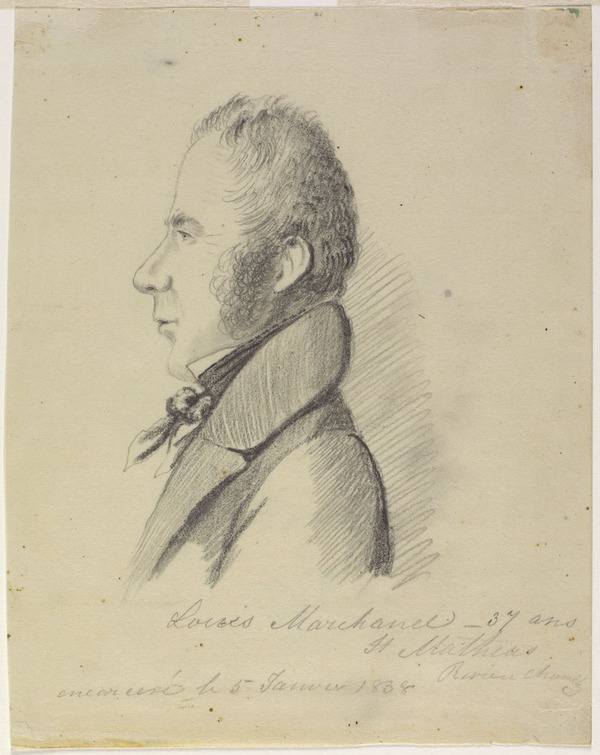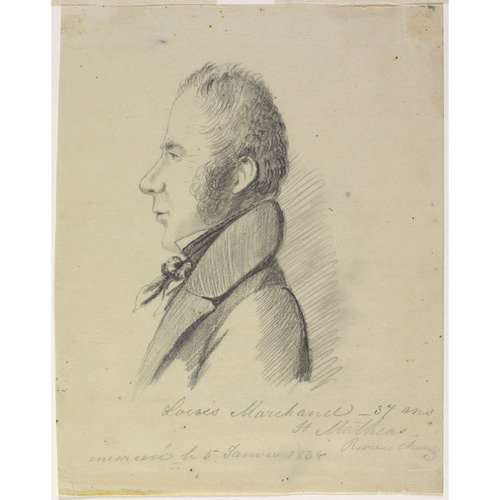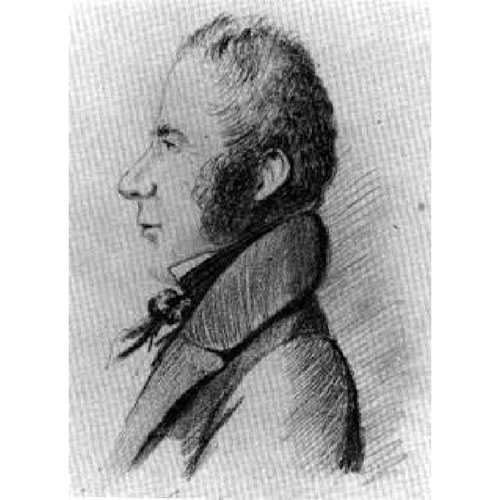MARCHAND, LOUIS (his original name was Levi Koopman), merchant, Patriote, public servant, businessman, and politician; b. 15 March 1800 at Amsterdam (Netherlands), son of Solomon Koopman, a jeweller, and Judith Diutz; d. 1 July 1881 in Montreal, Que.
Louis Marchand was a descendant of a Jewish family, originally from Prague (Czechoslovakia), that had settled in Amsterdam and had attained prominence in business and financial circles both in the Netherlands and in Paris. His father took the French name of Marchand in gratitude for the restoration of religious rights to the Jews in the Kingdom of Holland by Napoleon I. At the age of 18, Levi, who had received a good primary education in both Dutch and French, went to England to study English. While in that country he also became familiar with the history of British colonial acquisitions and inquired about the prospects for making a suitable living in North America. Soon after his return to the Netherlands he left for the United States where he worked for a short period. In 1823, receiving word that his father had died, he went back to his native land. There he took possession of his inheritance, only to lose everything on the stock market. It was at this point that he turned again to the United States in order to make his fortune anew.
A few months after his return Marchand went to Boston, where he heard talk of Lower Canada, and in particular of Montreal. Arriving in that city in 1826, he took lodgings in a boarding-house on Rue Saint-Gabriel which was frequented by rich merchants from the Chambly River region, including Eustache Soupras of Saint-Mathias. Soupras was looking for a clerk for his firm and, impressed with the young Dutchman’s knowledge of accounting, he immediately took him into his employ. Marchand soon left Montreal and went with Soupras to Saint-Mathias.
In the course of the next few years Marchand acquired a good name in Saint-Mathias and at Chambly, where he often had to go on business for Soupras. The inhabitants of both villages were most sympathetic and hospitable to the “young Frenchman,” as they called him. In consequence, he decided to settle permanently in Lower Canada and to enter fully into French Canadian society. Thus he converted to the Roman Catholic faith, and on 4 June 1828 was baptized at Chambly by Bishop Jean-Jacques Lartigue*, at which time he changed his name from Levi to Louis. On 4 Oct. 1830, at Longueuil, he married Charlotte, daughter of François Céré, who was a prominent farmer there; they were to have five sons and five daughters. In the mean time, since the volume of his firm’s transactions had increased substantially, Soupras had taken Marchand into partnership, and the two men set up Soupras et Marchand at Saint-Mathias, with a branch in Chambly. Marchand then began acquiring a wider circle of acquaintances in the Richelieu valley and before long throughout the district of Montreal. In 1832 he joined 74 other shareholders to found the Champlain and St Lawrence Railroad. He continued to engage in trade, enjoying success until 1837.
On the eve of the rebellion Marchand wholeheartedly supported the Patriotes. He participated in the assembly at Saint-Mathias, and then went as an official delegate of his village to the Assemblée des Six Comtés held at Saint-Charles-sur-Richelieu on 23 Oct. 1837. On 10 November he was one of a group of Patriotes under Pierre-Paul Démaray* and Joseph-François Davignon who attacked a cavalry troop returning from reconnoitring at Saint-Athanase (Iberville, Que.). Having implicated himself by participating in the popular unrest, Marchand fled to the United States on 17 November with Soupras and Timothée Franchère. The next day he was in Highgate, Vt, where in December he expressed to Robert Nelson* a desire to join the liberation army which the latter was trying to organize. At the beginning of 1838, trusting the promises of immunity made by Captain Frederick Marryat*, Marchand returned to Lower Canada, but he immediately had to surrender in Missisquoi County to Amable Loiselle, dispatched to arrest him. Incarcerated in the Montreal prison on 5 January on a charge of high treason, Marchand nearly died there. It was not until Lord Durham [Lambton*] issued his amnesty on 8 July that he was set free, on £1,000 bail. He returned to Saint-Mathias and found himself completely ruined because his property had been looted during his absence. Later in 1838 he was appointed a justice of the peace at Saint-Jean (Saint-Jean-sur-Richelieu), a post he held for four years, and in 1841 he acted as returning officer in Verchères County. Unable to find the means to resume his business, he decided to settle in Montreal in 1844.
That year Marchand entered into partnership with Narcisse-Birtz Desmarteau and began managing one of the two dry goods stores they jointly owned. In 1847 he held the office of assessor for the East Ward. At that time, sensing the potential of a steamship line to transport goods and passengers between Montreal and Quebec, he participated, with Jacques-Félix Sincennes*, Pierre-Édouard Leclère*, Desmarteau and others, in founding the Richelieu Company. He and Desmarteau jointly bought 12 shares in the steamer Jacques Cartier, and thus became major shareholders in the company. Marchand was active in the Association Saint-Jean-Baptiste de Montréal, serving as its vice-president in 1848 and again in 1849, when he and others sought a charter for the organization. The following year he became a director of the Richelieu Company, and he served as vice-president from 1852 to 1855 and again from 1860 to 1862. Also in 1850 he replaced Charles-Séraphin Rodier* on the Montreal Harbour Commission, sitting as a member until 1855. He and the two other commissioners, John Try and John Young*, enlarged the port and deepened Lake Saint-Pierre, thereby making a substantial contribution to the improvement of navigation on the St Lawrence. In 1851 he terminated his partnership with Desmarteau and opened his own dry goods and wholesale grocery business.
Already a fairly prominent figure in Montreal, Marchand decided to enter municipal politics. He was elected a councillor for Saint-Louis Ward in 1852, and was re-elected the following year. During his second term he served on the fire committee and, despite the opposition of some members of council, he succeeded in pushing through several by-laws, including one forbidding the building of wooden houses, to guard against a recurrence of the great fire of 1852. These drastic measures were regarded with great hostility by some citizens. Probably as a result of this animosity Marchand did not seek re-election in 1854, despite the urgings of Wolfred Nelson*, who had been a companion in arms in 1837 and was now running for mayor. Soon after, Marchand returned to the Netherlands to be with his family.
Observing upon his return to Canada East that the political climate in Montreal had changed, he agreed to re-enter politics. He was elected councillor for the East Ward in 1856 and alderman in the same ward in 1857. In the latter year he served as acting mayor, replacing Henry Starnes* for six months. In this capacity he prevented a riotous conflict between Irish Catholics and Orangemen on 12 July by taking stern measures and making use of the influence he had with many of the city’s Protestants. Re-elected alderman in 1858, 1859, and 1860, he served as chairman of the finance committee in the last two years. He resigned as alderman in 1860 and left politics.
As well as being active in politics, Marchand continued to manage his growing wholesale firm and engaged in various other business ventures. In 1852 he joined 64 of the most important Montreal capitalists in setting up the Montreal Exchange. Four years later he became president of the Montreal and Three Rivers Navigation Company, a position he held until 1858. In 1857 he formed a partnership with Louis Renaud* and Jean-Baptiste Renaud to found the De Salaberry Navigation Company of Montreal. In 1858 he joined the council of the Montreal Board of Trade of which he remained an active member until 1861.
During the last 20 years of his life, Marchand pursued his career in business and held several important public offices. He closed his firm in 1861 and the following year began to act as a banker and stockbroker. Appointed to the census commission in 1861, he became master of Trinity House in Montreal the following year and retained this office until that body was abolished in 1873. For several years he also served as a justice of the peace in Montreal and was a member of the first magistrates’ commission of the District of Montreal. Marchand is believed to have retired from business in 1878, the year his wife died. Several of their children were still alive at the time of his death, including the eldest son, Louis-François-Wilfrid, who is known especially for his translation of the account Pehr Kalm* wrote of his travels in North America.
Louis Marchand left a diary but it has not been located.
AC, Montréal, État civil, Catholiques, Notre-Dame de Montréal, 4 juill. 1881. ANQ-M, État civil, Catholiques, Saint-Antoine (Longueuil), 4 oct. 1830; Saint-Joseph (Chambly), 4 juin 1828. ANQ-Q, QBC 25, Événements de 1837–1838, nos.47, 48, 308, 465, 1363. Arch. de l’Assoc. Saint-Jean-Baptiste de Montréal (Montréal), Procès-verbaux des assemblées générales, 1848–49. Canadian Jewish Congress Arch. (Montreal), “Notes sur Louis Marchand,” David Rome, compil. (typescript). Montreal Board of Trade Arch. (Montreal), Minute books, 1858–61 (mfm. at ANQ-M). National Harbours Board (Montreal), Port of Montreal arch., Montreal Harbour Commission, Minute books, 1850–55. Bas-Canada, Statuts, 1831–32, c.58. Can., Prov. du, Statuts, 1849, c.149; 1852–53, c.24, c.146; 1857, c.170, c.171. Official documents and other information relating to the improvement of the ship channel between Montreal and Quebec (Montreal, 1884), 197–98. La Minerve, 2 juill. 1881. L’Opinion publique, 22 mars 1877. Le Populaire (Montréal), 15 déc. 1837. The Canadian album: men of Canada; or, success by example . . . , ed. William Cochrane and J. C. Hopkins (5v., Brantford, Ont., 1891–96), II: 101. Dominion annual register, 1880–81: 418. Fauteux, Patriotes, 312–13. Montreal directory, 1842–81. Quebec almanac, 1838–41. Souvenir Maisonneuve; esquisse historique de la ville de Montréal avec portraits et biographies . . . (Montréal, [1894]), 111–12. Atherton, Montreal, II: 594. L.-É. Morin, Histoire des travaux de la Commission du havre dans le port de Montréal (Montréal, 1894), 4–5. Robert Rumilly, Histoire de la Société Saint-Jean-Baptiste de Montréal: des Patriotes au fleurdelisé, 1834–1948 (Montréal, 1975), 59. Tulchinsky, River barons. Patricia Joseph, “Un Hollandais patriote de 1837,” La Presse (Montréal), 5 juin 1937: 70. Léon Trépanier, “Saint-Mathias en 1837–38,” Soc. hist. de la vallée du Richelieu, Cahier (s.l.), 5 (s.d.): 10–16; “Un Montréalais du siècle dernier: l’immigrant juif Louis Marchand,” Cahiers des Dix, 30 (1965): 131–48 (this article was first published as “La vie extraordinaire d’un échevin de Montréal,” La Patrie, 24, 31 juill., 7, 14 août 1955). Gerald Tulchinsky, “Une entreprise maritime canadienne-française: la Compagnie du Richelieu, 1845–1854,” RHAF, 26 (1972–73): 559–82.
Cite This Article
Michel de Lorimier, “MARCHAND, LOUIS (Levi Koopman),” in Dictionary of Canadian Biography, vol. 11, University of Toronto/Université Laval, 2003–, accessed February 8, 2026, https://www.biographi.ca/en/bio/marchand_louis_11E.html.
The citation above shows the format for footnotes and endnotes according to the Chicago manual of style (16th edition). Information to be used in other citation formats:
| Permalink: | https://www.biographi.ca/en/bio/marchand_louis_11E.html |
| Author of Article: | Michel de Lorimier |
| Title of Article: | MARCHAND, LOUIS (Levi Koopman) |
| Publication Name: | Dictionary of Canadian Biography, vol. 11 |
| Publisher: | University of Toronto/Université Laval |
| Year of publication: | 1982 |
| Year of revision: | 1982 |
| Access Date: | February 8, 2026 |





